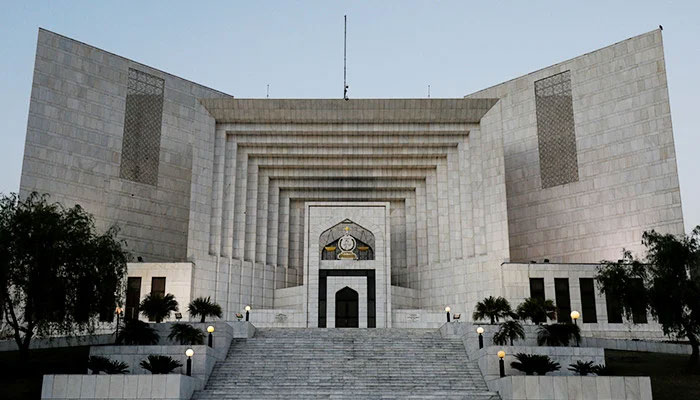New NAB law: PTI can make changes after assuming power, says Supreme Court
Justice Syed Mansoor Ali Shah said that after coming into power, the Pakistan Tehreek-i-Insaf could make legislation according to its will if it did not like the NAB amendments
ISLAMABAD: Justice Syed Mansoor Ali Shah said on Wednesday that after coming into power, the Pakistan Tehreek-i-Insaf could make legislation according to its will if it did not like the NAB amendments.
A three-member bench of the apex court, headed by Chief Justice Umer Ata Bandial and comprising Justice Ijazul Ahsen and Justice Syed Mansoor Ali Shah, heard the petition filed by the Pakistan Tehreek-i-Insaf Chairman challenging the amendments made by the coalition government to the National Accountability Ordinance (NAO) 1999.
During the hearing, Justice Syed Mansoor Ali Shah said that after assuming power, every government makes legislation and that if the Pakistan Tehreek-i-Insaf does not agree with the amendments made to the NAB law, it can legislate accordingly.
Khwaja Haris, counsel for Pakistan Tehreek-i-Insaf, while continuing his arguments, again cited the resolutions of the UN Convention, the European Union and the African Union against corruption.
“You mean that there are some benchmarks regarding corruption that should be maintained,” the CJP told the PTI counsel. The chief justice said that someone told him that the United Arab Emirates (UAE) has also been put on the “grey list” for having weak money-laundering laws. The chief justice asked the counsel to concentrate on the fundamental rights that may have affected the instant case.
Khwaja Haris argued that corruption jeopardises fundamental rights such as the right to a fair trial and equality. “Before these amendments, the NAB chairman had the power to summon records from any bank,” Khwaja Haris submitted.
Justice Ijazul Ahsen, another member of the bench, said that misuse of public money also affects the public trust. Justice Syed Mansoor Ali Shah said that arguments of the counsel are best for a speech in parliament.
“But no one is willing to listen and they do whatever they want,” Khwaja Haris responded, to which Justice Mansoor Ali Shah replied that one must first ensure his presence in parliament. “If you win the election, you can make amendments,” Justice Shah told the counsel.
Khwaja Haris submitted that every country in the world stresses making legislation for combating corruption and for strict punishments as well. The chief justice told the counsel that the law minister, after attending the Judicial Commission, had said that the debate was not for any legislation. Still, the committee constituted to hold a debate on the NAB amendments had members who attended and debated the issue.
“Please share with us the details of the debate if it is on the NAB amendments,” the CJP told Khwaja Haris. The counsel submitted that in most of the NAB references, the accused were acquitted due to the absence of original records, and NAB officials told courts that they were helpless. “Had Section 31(a) not been omitted in the NAB amendments, Finance Minister Ishaq Dar could not have returned to the country.” Meanwhile, the court adjourned the hearing for Thursday (today).
-
 Sterling K. Brown's Wife Ryan Michelle Bathe Reveals Initial Hesitation Before Taking On New Role
Sterling K. Brown's Wife Ryan Michelle Bathe Reveals Initial Hesitation Before Taking On New Role -
 BAFTA Film Awards Winners: Complete List Of Winners Updating
BAFTA Film Awards Winners: Complete List Of Winners Updating -
 Millie Bobby Brown On Her Desire To Have A Big Brood With Husband Jake Bongiovi
Millie Bobby Brown On Her Desire To Have A Big Brood With Husband Jake Bongiovi -
 Biographer Exposes Aftermath Of Meghan Markle’s Emotional Breakdown
Biographer Exposes Aftermath Of Meghan Markle’s Emotional Breakdown -
 Backstreet Boys Admit Aging Changed Everything Before Shows
Backstreet Boys Admit Aging Changed Everything Before Shows -
 Ryan Coogler Makes Rare Statements About His Impact On 'Black Cinema'
Ryan Coogler Makes Rare Statements About His Impact On 'Black Cinema' -
 Rising Energy Costs Put UK Manufacturing Competitiveness At Risk, Industry Groups Warn
Rising Energy Costs Put UK Manufacturing Competitiveness At Risk, Industry Groups Warn -
 Kate Middleton Makes Glitzy Return To BAFTAs After Cancer Diagnosis
Kate Middleton Makes Glitzy Return To BAFTAs After Cancer Diagnosis -
 NFL Star Rondale Moore Dies Aged 25, Minnesota Vikings Pay Tribute
NFL Star Rondale Moore Dies Aged 25, Minnesota Vikings Pay Tribute -
 Kim Kardashian Makes Huge Career Move Weeks After Going Public With Lewis Hamilton
Kim Kardashian Makes Huge Career Move Weeks After Going Public With Lewis Hamilton -
 Shia LaBeouf Draws Attention For Sweet Reason After Spending Time In Jail Over Brawl Incident Amid Mardi Gras Bash
Shia LaBeouf Draws Attention For Sweet Reason After Spending Time In Jail Over Brawl Incident Amid Mardi Gras Bash -
 Princess Eugenie, Beatrice Receive Strong Warning After Andrew Arrest: 'Zero Tolerance'
Princess Eugenie, Beatrice Receive Strong Warning After Andrew Arrest: 'Zero Tolerance' -
 Rihanna 38th Birthday Detail Breaks The Internet, Featuring Unexpected Huge Item
Rihanna 38th Birthday Detail Breaks The Internet, Featuring Unexpected Huge Item -
 Liza Minnelli Recalls Rare Backstage Memory With Mum Judy Garland In New Memoir
Liza Minnelli Recalls Rare Backstage Memory With Mum Judy Garland In New Memoir -
 Armed Intruder Shot Dead At Trump's Mar-a-Lago Residence: US Secret Service
Armed Intruder Shot Dead At Trump's Mar-a-Lago Residence: US Secret Service -
 Total Lunar Eclipse: What You Need To Know And Where To Watch
Total Lunar Eclipse: What You Need To Know And Where To Watch




